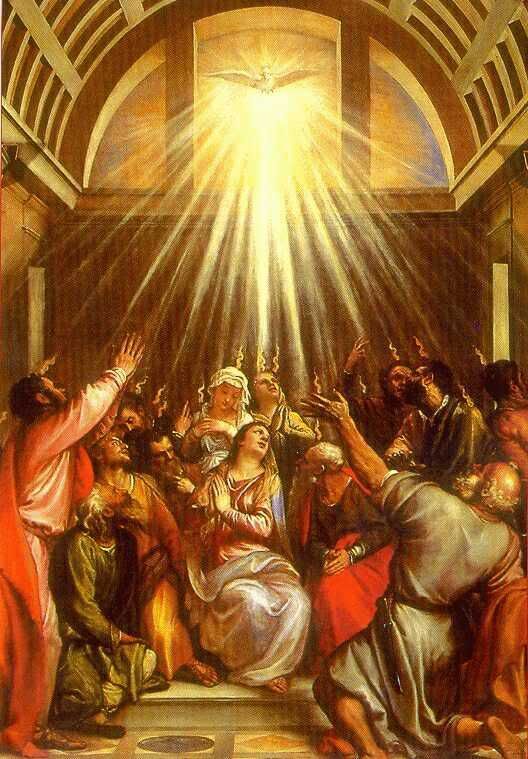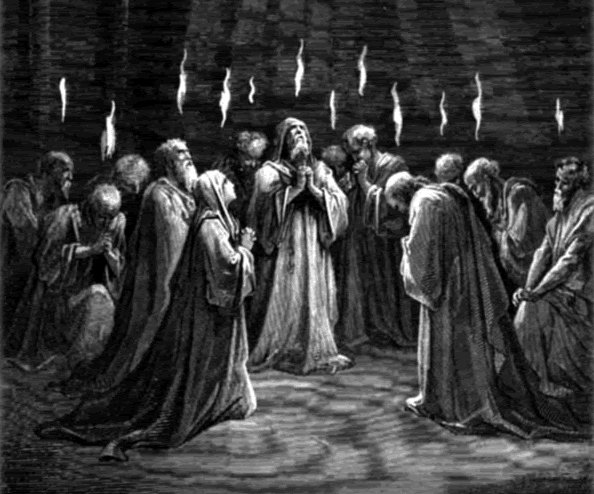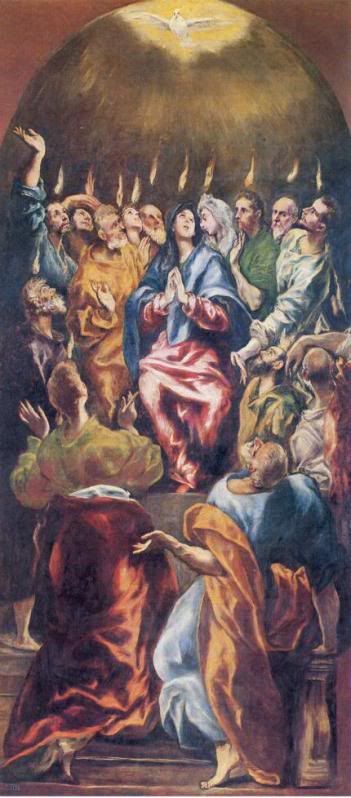"Through the Holy Spirit we are restored to paradise, led back to the Kingdom of heaven, and adopted as children, given confidence to call God "Father" and to share in Christ's grace, called children of light and given a share in eternal glory." (Saint Basil)
Today we celebrate Pentecost, fifty days following Easter, marking the end of the Church’s springtime, and recalling the descent of the Holy Spirit upon the apostles and Our Blessed Mother in the Upper Room in Jerusalem. Pentecost, following the Resurrection of the Lord, and his Ascension into Heaven, is the third Glorious Mystery of the Holy Rosary.
15"If you love me, you will obey what I command. 16And I will ask the Father, and he will give you another Counselor to be with you forever
23"If anyone loves me, he will obey my teaching. My Father will love him, and we will come to him and make our home with him. 24He who does not love me will not obey my teaching. These words you hear are not my own; they belong to the Father who sent me.
25"All this I have spoken while still with you. 26But the Counselor, the Holy Spirit, whom the Father will send in my name, will teach you all things and will remind you of everything I have said to you. (John 14: 15-16; 23b-26)
A few weeks ago, we read part of Jesus’ “farewell message” in the Gospel of John, focusing on the unending, reciprocal love of the Lord. We read again today in the Gospel of the extension of that love promised to us by Christ, “another Counselor to be with us forever,” the Holy Spirit. Jesus asks for the intercession of the Holy Spirit here, in the teaching of the disciples, and the Father willingly gives of it. As well as the Holy Spirit, however, Jesus himself continues to instruct the disciples—and us-- which suggests the Spirit mediates Jesus' presence.
It is clear that the Father and the Son are personally present with the believers and that the Spirit has a role clearly distinguished from, though in union with, the Father and the Son. The Holy Spirit proceeds from the Father and the Son, but as God, is equal to the Father and the Son. The Holy Spirit’s teaching role is focused on the historical Jesus, as indicated by the reference to “all things” and “everything” (verse 26) and the use of the past tense. The Holy Spirit dwells in the Church as the source of its life and sanctifies souls through the gift of grace. The sanctification of mankind is attributed to the Holy Spirit because He is the love of the Father and the Son and because the sanctification of man by grace shows forth God's boundless love.
As Saint Augustine wrote of the Holy Spirit, as a gift of God’s Love: “Wherefore, if Holy Scripture proclaims that God is love, and that love is of God, and works this in us that we abide in God and He in us, and that hereby we know this, because He has given us of His Spirit, then the Spirit Himself is God, who is love. Next, if there be among the gifts of God none greater than love, and there is no greater gift of God than the Holy Spirit, what follows more naturally than that He is Himself love, who is called both God and of God? And if the love by which the Father loves the Son, and the Son loves the Father, ineffably demonstrates the communion of both, what is more suitable than that He should be specially called love, who is the Spirit common to both? For this is the sounder thing both to believe and to understand, that the Holy Spirit is not alone love in that Trinity, yet is not specially called love to no purpose.”
And in that way, we see, on Pentecost—which we celebrate today—the re-gifting of love, of Jesus, from the Father, through the Holy Spirit. Not only were the disciples—and we, the faithful, by extension—filled with the gifts of the Holy Spirit, we are re-awakened to the love and teachings of Christ—a love which burned within the disciples, and sprang forth to preach to the nations after being rekindled the power of the Spirit!
The arrival of the Holy Spirit fulfilled the promises Jesus made the disciples, read in the Gospel of John. It also, through the mediation of the Spirit, changed Jesus’ mission on earth. Many refer to Pentecost as the birth of the Church on earth, as the disciples began preaching in earnest that Jesus was the way to eternal salvation.
1When the day of Pentecost came, they were all together in one place. 2Suddenly a sound like the blowing of a violent wind came from heaven and filled the whole house where they were sitting. 3They saw what seemed to be tongues of fire that separated and came to rest on each of them. 4All of them were filled with the Holy Spirit and began to speak in other tongues as the Spirit enabled them.
5Now there were staying in Jerusalem God-fearing Jews from every nation under heaven. 6When they heard this sound, a crowd came together in bewilderment, because each one heard them speaking in his own language. 7Utterly amazed, they asked: "Are not all these men who are speaking Galileans? 8Then how is it that each of us hears them in his own native language? 9Parthians, Medes and Elamites; residents of Mesopotamia, Judea and Cappadocia, Pontus and Asia, 10Phrygia and Pamphylia, Egypt and the parts of Libya near Cyrene; visitors from Rome 11 (both Jews and converts to Judaism); Cretans and Arabs-we hear them declaring the wonders of God in our own tongues!" (Acts 2:1-11)
We are told that the Holy Spirit descended upon the gathering of believers in the form of tongues of fire, and as such, the liturgical color for Pentecost is red, a reminder of the flames that "rested on them.” Another symbol for the Holy Spirit is the dove, usually emitting golden rays of light.
The Holy Spirit gave the apostles gifts of grace through which they would undertake the evangelical mission of the Church. On the day of Pentecost, the apostles were given the miraculous "gift of tongues" -- so that everyone from every country understood the message of salvation as if they were hearing it in their own languages. Thousands were converted by the preaching of Peter and the other apostles on that day alone.
But it was not just for the early disciples that the Holy Spirit came—it was for all of us. As Dom Columba Marmion, an Irish monk beatified by Pope John Paul II, wrote: “But it is also for us that the Holy Spirit has come, for the group in the Cenacle represented the whole Church. The Holy Spirit came to remain with the Church forever. This is the promise of Jesus Himself. He dwells in the Church permanently and unfailingly, performing in it without ceasing, His action of life-giving and sanctification. He establishes the Church infallibly in the truth. It is He who makes the Church blossom forth with a marvelous supernatural fruitfulness, for He brings to life and full fruition in Virgins, Martyrs, Confessors, those heroic virtues which are one of the marks of true sanctity.”
Pentecost represents God’s gracious, enabling presence actively at work among His people, calling and enabling us to dynamically and visibly live the witness of being His people. Pentecost Sunday is a day to celebrate hope, a hope evoked by the knowledge that God-- through the Holy Spirit-- is at work among us, within each of us. It is a celebration of newness, of recreation, of renewal of purpose, mission, and calling as God’s people. It is a celebration of God’s ongoing work in the world. Yet, it is also a recognition that His work is done through His people as He pours out His presence upon them. It is the work of salvation and redemption, for ourselves, our communities, our world!
Reflection of Pope John XXIII on Pentecost:
At the Feast of Pentecost I take the sacred Book in my hands and turn eagerly to the first page of the Old Testament, and then to the first page of the New. The first page of the Old Testament describes the creation of the world, saying that "the Spirit of God was moving on the waters". This refers to the whole universe, the seas and land masses, the animal, vegetable and mineral kingdoms: a triple realm, a manifold order; and it refers also to the governments of men, of races, peoples and tribes, inspired and moved by energies common to all mankind, and to the history of humanity slowly evolving through the centuries according to a Divine plan.
All nature, then, belongs to the temporal order, but always in the sight of God and subject to his power.
And now we turn to the first page of the Gospel, the New Testament, which begins with the sound of an angel's voice: "Do not be afraid, Mary, for you have found favor with God...You will bear a son, and you shall call his name Jesus."
With this announcement to Mary there begins the epic of Redemption, which has Christ for its all-radiant Sun, the source of divine life and sanctifying grace.
Come, thou Holy Spirit come:
and from thy celestial home
send thy light and brilliancy.
Come, thou father of the poor,
come who givest all our store.
What is filthy make thou pure,
what is wounded work its cure,
water what is parched and dry.
Gently bend the stubborn will,
warm to life the heart that’s chill,
guide who goeth erringly.
Fill thy faithful who adore,
and confess thee evermore,
with thy sevenfold mystery.
Here thy grace and virtue send,
grant salvation in the end, and in heaven felicity.
Amen
Why pray the Rosary every day for a year?
Each time the Blessed Virgin has appeared-- whether it be to Saint Bernadette Soubirous at Lourdes; to Lucia, Jacinta, and Francisco at Fatima; or to Mariette Beco at Banneux-- she has asserted the importance, saving grace, and power of praying the Holy Rosary on a daily basis. Based upon her words, the Rosary is penance and conversion for sinners, a pathway to peace, an end to war, and a powerful act of faith in Jesus Christ. Pope Paul VI presented the Rosary as a powerful means to reach Christ "not merely with Mary but indeed, insofar as this is possible to us, in the same way as Mary, who is certainly the one who thought about Him more than anyone else has ever done."
To show us how this is done, perhaps no one has been more eloquent than the great Cardinal Newman, who wrote: "The great power of the Rosary consists in the fact that it translates the Creed into Prayer. Of course, the Creed is already in a certain sense a prayer and a great act of homage towards God, but the Rosary brings us to meditate again on the great truth of His life and death, and brings this truth close to our hearts. Even Christians, although they know God, usually fear rather than love Him. The strength of the Rosary lies in the particular manner in which it considers these mysteries, since all our thinking about Christ is intertwined with the thought of His Mother, in the relations between Mother and Son; the Holy Family is presented to us, the home in which God lived His infinite love."
As Mary said at Fatima, "Jesus wants to use you to make Me known and loved. He wishes to establish the devotion to My Immaculate Heart throughout the world. I promise salvation to whoever embraces it; these souls will be dear to God, like flowers put by Me to adorn his throne."

Subscribe to:
Post Comments (Atom)

















PRAYER AND BLESSiNG OF HOLY SPiRiT 4 MY CHiLDREN
prayer request for my cancer sick friend gerald fortier